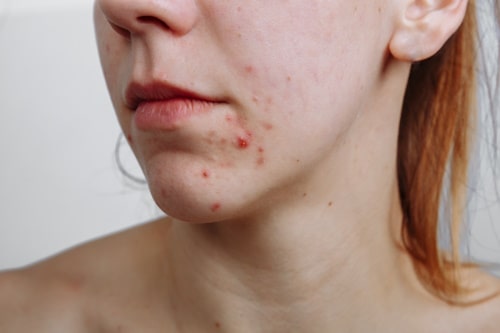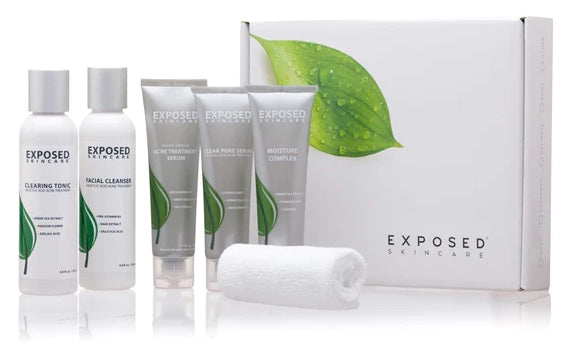Do you have questions about the effects of nicotine on your skin? For decades, the topic of nicotine and acne has been controversial, often making headlines in skincare and health discussions. While it's well-known that nicotine causes several health problems, its role in acne breakouts is less straightforward.
This comprehensive guide will explore the intricate relationship between nicotine and acne, from vaping to cigarettes and everything in between. Answer your biggest questions regarding acne nicotine and acne.
Also read: How to choose the best acne treatment
Biggest Take-Aways:
- Nicotine has multiple adverse effects on the skin, including the ability to cause acne through blood vessel constriction and hormonal changes.
- Both traditional cigarettes and e-cigarettes contribute to acne and other skin issues, making them equally harmful in this context.
- Quitting nicotine benefits overall health but can lead to temporary acne flare-ups; hence, a proactive skincare routine is essential during this period.
- Exposed Skin Care offers a comprehensive range of products that can help manage and treat nicotine-induced acne, making it a reliable choice for skincare.

The Multifaceted Nature of Acne
Before we delve into the connection between nicotine and acne, it's essential to understand the complexities of acne as a skin condition. Various factors, including hormonal changes, hygiene, diet, and stress, can influence acne.
The Different Types of Acne
- Atypical Post-Adolescent Acne (APAA): This form of acne is common in adults and can be influenced by lifestyle choices.
- Blackheads and Whiteheads: These are caused by clogged pores and hair follicles.
- Hormonal Acne: Linked to hormonal changes, often affecting teenagers but can also occur in adults.
What Contributes to Acne?
- Sebum Overproduction: Excess oil can clog pores, causing acne.
- Dead Skin Cells: The accumulation of dead skin cells can contribute to acne.
- Poor Hydration: Dehydrated skin can lead to dry skin, which may worsen acne.
Understanding the Role of Nicotine
Nicotine is a highly addictive stimulant in various products like cigarettes, vapes, and e-cigarettes. But how does nicotine contribute to acne?
Effects on Blood Vessels
Nicotine can constrict blood vessels, restricting blood flow to the skin. Reduced blood flow limits the skin's ability to heal and receive essential oxygen and nutrients, increasing the risk of acne.
Nicotine and Sebum Production
Nicotine affects the sebaceous glands, potentially causing them to produce more sebum. Excess sebum can clog pores, leading to acne breakouts.

Nicotine and Hormonal Changes
Nicotine also impacts hormonal levels, exacerbating existing skin conditions and worsening acne.
Dehydrating Effects
Nicotine can dehydrate the skin. Dry skin is more prone to irritation, which can lead to acne.
The Vaping Phenomenon: Does Vaping Cause Acne?
Vaping has gained immense popularity as an alternative to smoking cigarettes. While it's commonly considered a "safer" alternative, research shows that vaping can also cause acne.
Chemicals Found in E-Cigarettes
Propylene glycol, one of the chemicals found in e-cigarettes, has been known to irritate the skin, increasing the chance of skin problems such as acne.
Vaping Involves Nicotine
Most vape pens and e-cigs contain nicotine, which, as we've discussed, has the potential to cause acne.
Vaping and Skin Type
The effects of vaping on acne can vary based on skin type. Some people may experience more significant acne flare-ups, while others may not notice any changes.
The Cigarette Culprit: Smoking and Acne
Smoking cigarettes involves inhaling nicotine, along with other cancer-causing substances. Not only does this harm overall health, but it also affects skin health.
How Smoking Cigarettes Can Lead to Acne
Cigarette smoke contains many toxins that negatively affect skin health. These toxins can contribute to acne by affecting blood flow, irritating the skin, and causing inflammation.

Premature Skin Aging
Smoking cigarettes is known for causing premature skin aging, reducing elasticity, and leading to unsightly skin problems, including acne.
The Risk of Skin Cancer and Infections
Smokers have a higher risk of developing skin cancer and skin infections, which can also increase the prevalence of acne.
Quitting the Habit: Nicotine Withdrawal and Acne
When you quit smoking or stop using nicotine products, you may experience nicotine withdrawal symptoms like irritability. While quitting benefits overall health, nicotine withdrawal can lead to temporary acne breakouts.
Withdrawal Symptoms and Skin
During the initial stages of quitting, you might experience increased acne breakouts as your body adjusts to the absence of nicotine.
Long-term Benefits for Skin Health
Over time, quitting smoking and avoiding nicotine products will improve your skin health, reducing the risk of acne and other skin conditions.
Tips for a Smooth Transition
- Stay Hydrated: Ensure you’re well-hydrated to combat dry skin and acne.
- Maintain a Skincare Routine: A consistent skincare routine can help manage acne during nicotine withdrawal.
- Monitor Hormonal Changes: Keep an eye on hormonal fluctuations, which can also cause acne.
Managing Acne with Exposed Skin Care
Finding the right skincare regimen is crucial if you're struggling with acne, especially the kind exacerbated by nicotine addiction. Exposed Skin Care offers everything you need to know and use for managing acne effectively.
Here are some benefits of Exposed Skin Care:
- Comprehensive Kits: Whether dealing with a single pimple or a more severe form of acne, our kits contain multiple products that address various issues.
- Treatment Serum: Specifically designed to tackle comedones and flare-ups, our serum penetrates deep into the skin's surface to eliminate bacteria.
- Natural Ingredients: Our products contain natural extracts that mitigate the adverse effects on the skin that many factors can contribute to, including the connection between smoking and acne.
- Clearing Tonic: This product helps to balance the skin's pH and is ideal for dealing with rosacea and other health complications related to the skin.
When using Exposed Skin Care products, you can be confident that you're treating your skin to the best possible care, minimizing the impact of any addictive substance like nicotine or harmful elements found in vape liquid.
Conclusion
The link between nicotine and acne is intricate but undeniable. The evidence points to a strong connection, whether it's the constriction of blood vessels, hormonal fluctuations, or the irritants found in e-cigarettes.
Nicotine can cause acne by affecting various physiological and biochemical processes in the body, leading to flare-ups and more severe forms of acne. While quitting nicotine products is an essential step for overall health, managing the acne that can occur during the withdrawal phase is equally crucial.
With potential flare-ups and increased sebum production, those seeking to quit must prepare for this transitional period. Beyond just quitting, a proactive approach to skincare is vital for managing the adverse effects of nicotine on your skin.
A rigorous skincare routine can go a long way in counteracting the negative impact of nicotine and other contributing factors. Here's where Exposed Skin Care can be a game-changer. With its comprehensive range of products that tackle various aspects of acne, you can manage and even mitigate the skin issues exacerbated by nicotine.
In sum, understanding the relationship between nicotine and acne can empower you to make informed decisions about your lifestyle choices and skincare routine, setting you on a path to healthier, clearer skin.
FAQs
What is the connection between nicotine and acne?
Nicotine constricts blood vessels and affects hormonal levels, which can contribute to acne. It also can cause the skin to become dehydrated, leading to further skin issues.
Does vaping cause acne?
Yes, vaping can cause acne. Chemicals found in e-cigarettes, like propylene glycol, can irritate the skin and contribute to acne.
Is acne from smoking permanent?
No, the acne caused by smoking is not permanent. However, quitting smoking and adopting a robust skincare routine can significantly help improve your skin's condition.
Can quitting nicotine lead to acne?
Yes, nicotine withdrawal can cause temporary acne flare-ups as your body adjusts to the absence of the substance.
How can Exposed Skin Care help manage acne?
Exposed Skin Care offers a range of products specifically designed to treat various types of acne, providing a comprehensive approach to skincare that can be particularly helpful for those dealing with nicotine-related acne.


















